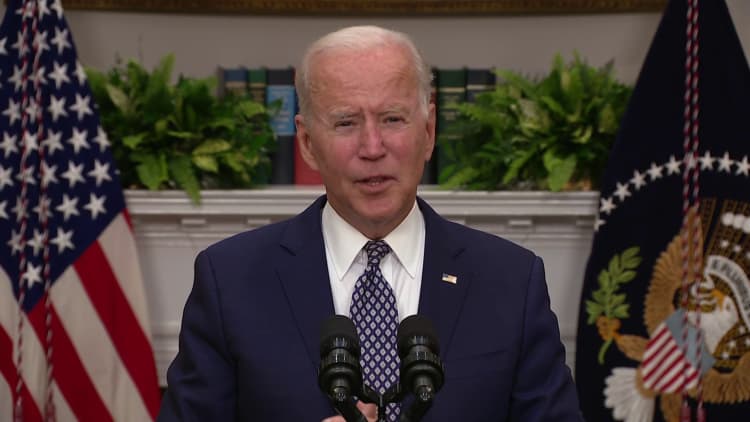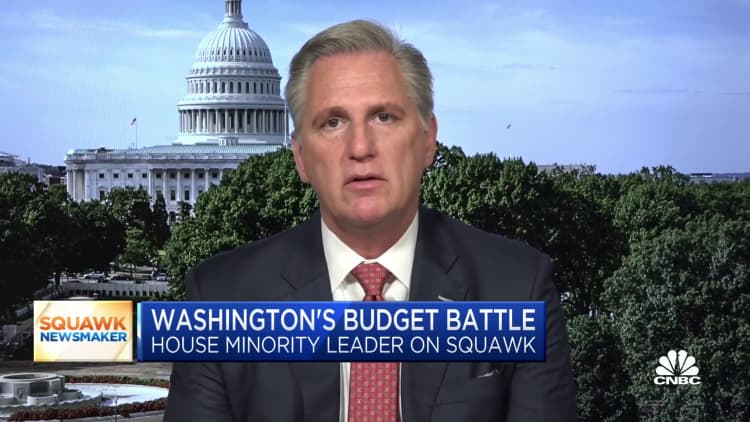WASHINGTON — House Democrats just patched up a party fracture to take a critical step forward with a mammoth economic agenda.
But the path ahead could get trickier as party leaders try to thread a legislative needle to pass more than $4 trillion in new spending.
In the coming weeks, Democrats aim to approve a $1 trillion bipartisan infrastructure plan and up to $3.5 trillion in investments in social programs. Passing both will require a heavy lift, as leaders will need to satisfy competing demands of centrists wary of spending and progressives who want to reimagine government's role in American households.
The House is leaving Washington until Sept. 20 after taking key steps toward pushing through the sprawling economic plans. The chamber on Tuesday approved a $3.5 trillion budget resolution and advanced the infrastructure bill, as House Speaker Nancy Pelosi, D-Calif., promised centrist Democrats to take up the bipartisan plan by Sept. 27.
The Senate already passed the infrastructure legislation, so a final House vote would send it to Biden's desk for his signature.
Now that both chambers have passed the budget measure, Democrats can move without Republicans to push through their spending plan via reconciliation. Party leaders want committees to write their pieces of the bill by Sept. 15 before budget committees package them into one massive measure that can move through Congress. Committees could start marking up legislation in early September.
Party leaders face a challenge in coming up with a bill that will satisfy centrists who want to trim back the $3.5 trillion price tag and progressives who consider it the minimum Congress should spend. As one defection in the Senate — and four in the House — would sink legislation, Democrats have to satisfy a diverse range of views to pass their agenda.
"We write a bill with the Senate because it's no use doing a bill that's not going to pass the Senate, in the interest of getting things done," Pelosi told reporters on Wednesday.
Given the magnitude of the legislation, passing it quickly could prove difficult. To appease congressional progressives who have prioritized passage of the budget bill, Democrats could move to pass both proposals at about the same time.
While Pelosi gave a Sept. 27 target date to approve the infrastructure plan, the commitment is not binding. Still, she noted Wednesday that Congress needs to pass the bill before surface transportation spending authorization expires Sept. 30.
"We have long had an eye to having the infrastructure bill on the President's desk by the October 1, the effective date of the legislation," she wrote in a separate letter to Democrats on Wednesday.

Democrats say the bills combined will provide a jolt to the economy and a lifeline for households. Supporters of the Democratic spending plan, including Pelosi and Senate Budget Committee Chair Bernie Sanders, I-Vt., have cast it as the biggest expansion of the U.S. social safety net in decades.
"This is a truly historic opportunity to pass the most transformative and consequential legislation for families in a century, and will stand alongside the New Deal and Great Society as pillars of economic security," Pelosi wrote to colleagues Wednesday.
The plan would expand Medicare, paid leave and child care, extend enhanced household tax credits and encourage green energy adoption, while hiking taxes on corporations and the wealthy. Democrats hope to sell a wave of new support for families as they campaign to keep control of Congress in next year's midterms.
Those elections, though, have helped to generate staunch opposition on the other side of the aisle. The GOP has cited the trillions in new spending and the proposed reversal of some of its 2017 tax cuts in trying to take down the Democratic budget bill.
Republicans and some Democrats have in recent weeks said that another $4.5 trillion in fiscal stimulus could not only boost economic growth but have the adverse effect of fueling inflation.
The inflation debate
The GOP, hoping to recapture both the House and the Senate in 2022, has made rising prices a centerpiece in their attacks on Biden's economic agenda.
"Inflation is spiking," Sen. Tom Cotton, R-Ark., wrote Monday. "Does anyone in their right mind think we should spend another $3.5 trillion? That's what Pelosi is ramming through."

Those claims are not purely conjecture. The Labor Department earlier this month reported that its consumer price index rose 5.4% in July from a year earlier, in line with June's figure and matching the largest jump since August 2008.
The inflation debate has also made for strange bedfellows, and some prominent Democrats have joined their GOP counterparts in cautioning against runaway spending.
Former Treasury Secretary Larry Summers and conservative Democrat Sen. Joe Manchin of West Virginia have both flagged rising inflation risks in recent months.
Summers, who served as Treasury secretary under former President Bill Clinton, wrote in May that the "inflation risk is real." Manchin, meanwhile, urged Federal Reserve Chairman Jerome Powell earlier this month to taper the central bank's emergency stimulus efforts.
Hot inflation, if temporary, isn't necessarily a problem as an economy works to correct a mismatch between supply and demand. That is, generally, the opinion of Fed chief Powell.
Powell, himself a Republican who was appointed by then-President Donald Trump, believes that the inflation pressures will soon fade as the U.S. economy works through pent-up demand from 2020 business closures.
But, if Powell is wrong, inflation can quickly become a headache.
Rising gasoline, housing and grocery prices can erode Americans' purchasing power if workers aren't able to negotiate wage increases at the same pace. Every dollar, in effect, can buy a fewer number of apples, lightbulbs, haircuts and gallons of gasoline.
The White House, hoping to enact Democrats' campaign promises before the 2022 midterms, has tended to side with Powell's view of "transient" inflation.
The administration and some progressives have suggested that improving the nation's infrastructure would work to ease the supply-chain bottlenecks that economists blame for some of the inflation worries.
Jared Bernstein and Ernie Tedeschi, two economists on Biden's Council of Economic Advisers, wrote Monday that the plan to improve the nation's physical infrastructure is "an antidote for inflationary pressure."
Infrastructure fixes "should be expected to have little, if any, effect on inflationary pressures in the short-term and to ease them over the long term," the pair wrote in a White House blog post. "As economic capacity builds, cost pressures are less binding on firms making new goods and services, and price pressures gradually ease."
Congressional Democrats have also downplayed the risk of long-term inflation as they tout the benefits their plans could have for households. They aim to build on the $1.9 trillion coronavirus relief package passed early in Biden's term, which provided a wave of new relief to families this year.
In keeping her members on board with her infrastructure and budget strategy this week, Pelosi stressed the need to follow through on Biden's agenda for the working class.
"At the end of the day, what had to prevail was the president's vision and the needs of America's working families," the speaker said Wednesday.
— CNBC's Jacob Pramuk contributed to this report from Pennsylvania, and CNBC's Thomas Franck contributed from Washington.



